text to speech tutorials
Top 5 Free Text-to-Speech APIs
Text-to-speech technology is quickly becoming an important part of the internet to create accessible and engaging content. Whether you are developing a mobile app or managing a simple blog, you can benefit from text to speech APIs to get numerous benefits.
There are many different TTS APIs available, so you have to choose the right one to get the perfect balance between quality, features, and cost-effectiveness.

In this article, we will explore the top 5 text-to-speech APIs that also offer free tiers or trials to help you pick the right one.
1. WebsiteVoice
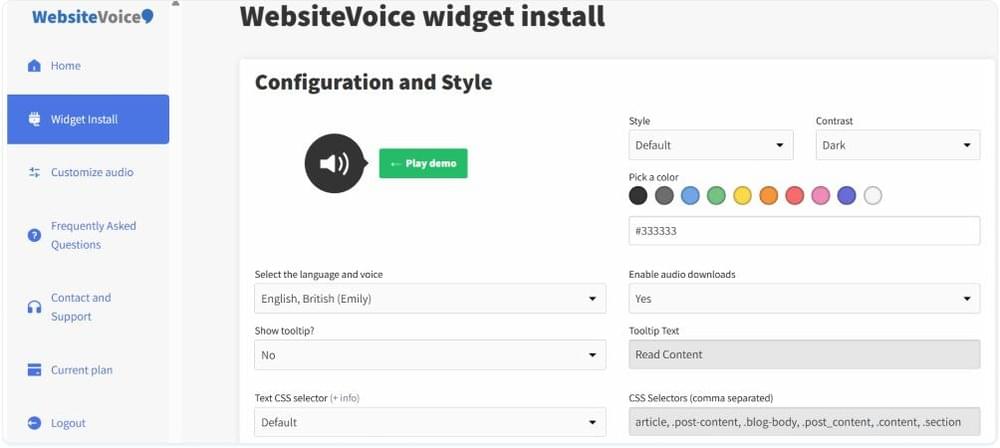
WebsiteVoice is a highly specialized text-to-speech solution. It is meant specifically for content creators, developers, bloggers, and website owners who want to add audio functionality to their content.
WebsiteVoice is not a general-purpose TTS tool. It focuses on one clear mission of helping you add a “play” button to your website that turns written content into natural-sounding speech using AI.
The targeted nature of WebsiteVoice makes it highly useful for blogs, news sites, educational websites, and any other content-heavy websites that want to improve accessibility and user engagement.
Moreover, you will find the free text-to-speech API in WebsiteVoice through its 14-day trial. The platform ensures quick and easy implementation to ensure you can try out the tool and add TTS functionality, even without technical skills.
Keep in mind that if you want to keep using WebsiteVoice for more than 14 days, you’ll have to buy one of its paid plans.
Pros:
- Quick website integration with “play” button TTS functionality
- Supports 35+ languages and accents with 60+ AI realistic voices
- Easy setup process with extensive support for:WordPress, Shopify, Wix, Squarespace, Blogger, Joomla, or Webflow
- Improve website accessibility and user engagement
- Clean, intuitive interface designed for non-technical users
- Custom outro/intro sections can be added in each playback
- Ability to control voice speed and pitch
Cons:
- WebsiteVoice is not a completely free service, as you will have to buy a paid plan after the 14-day free trial
- Highly specific features and specialized scope compared to general-purpose TTS APIs
2. Google Cloud Text-to-Speech API
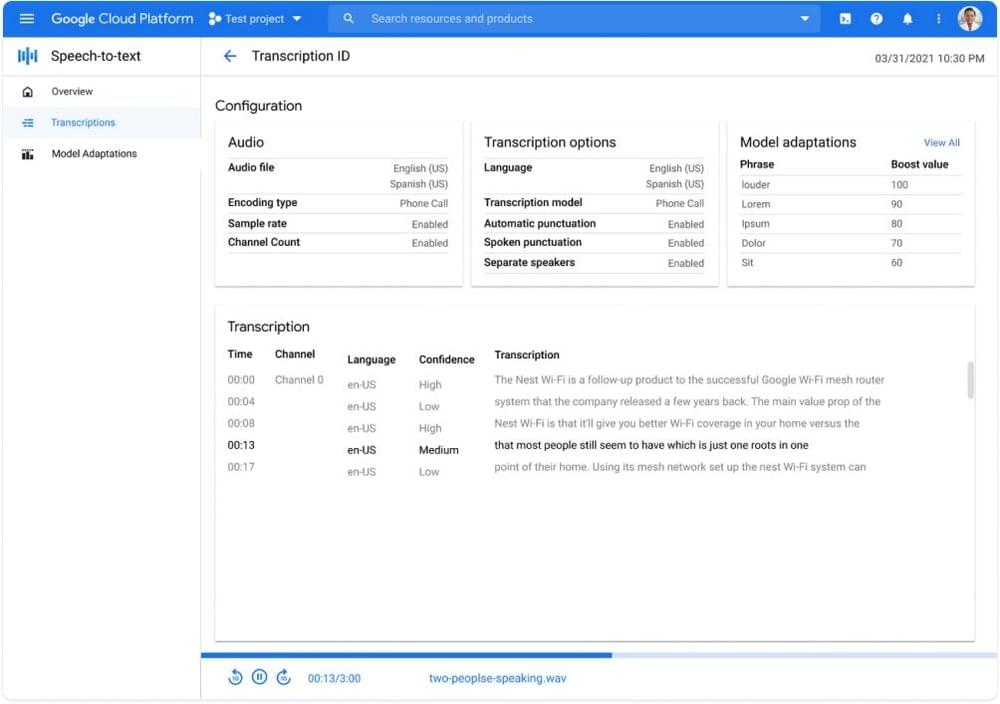
Google Cloud Text-to-Speech API is powered by Google’s advanced AI technologies. WaveNet and DeepMind work together to produce natural-sounding speech synthesis. Moreover, the service has extensive language support and high-quality neural voices.
One of the standout features of Google’s free text-to-speech API is Neural2 voices. You can create custom voice models using Neural2 with your own audio recordings. Hence, businesses that want to maintain brand consistency in their voice applications find the Google text-to-speech API highly useful.
Pros:
- Excellent voice quality with WaveNet and Neural2 technology
- Support multiple languages and voice options
- Custom voice creation and training capabilities
- Multiple export options to handle various audio formats
Cons:
- Extensive usage requires paid plans beyond the free tier
- Steep learning curve, especially for custom voice training
- You need to setup Google Cloud account setup
3. IBM Watson Text to Speech API
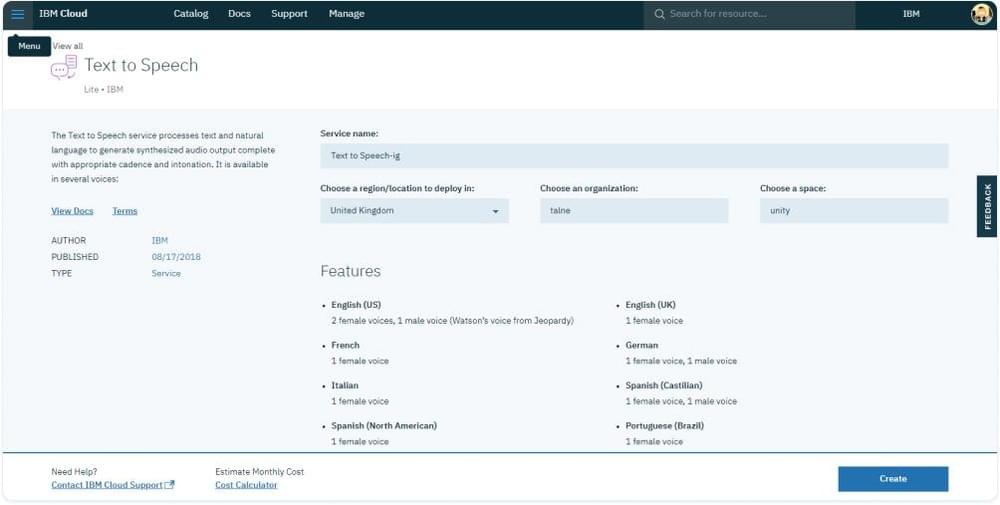
IBM Watson Text to Speech is an enterprise-grade AI text-to-speech solution. It offers neural voices with nuanced speech output options. Moreover, the platform is designed to facilitate business applications via multiple customization options and reliable security measures.
The primary feature of IBM Watson text-to-speech API is the balance between enterprise reliability and advanced AI features. You can even handle complex text processing requirements with this and get excellent voice synthesis results.
Pros:
- High-quality neural voices
- Strong security and data protection measures
- Multiple language support with accent variations
Cons:
- Other than the limited free tier, pricing can be quite high for small-scale projects
- Complex setup process
If you want a more simple and accessible solution, you should use WebsiteVoice as it eliminates the complexity and focuses specifically on converting website content to audio.
4. Amazon Polly
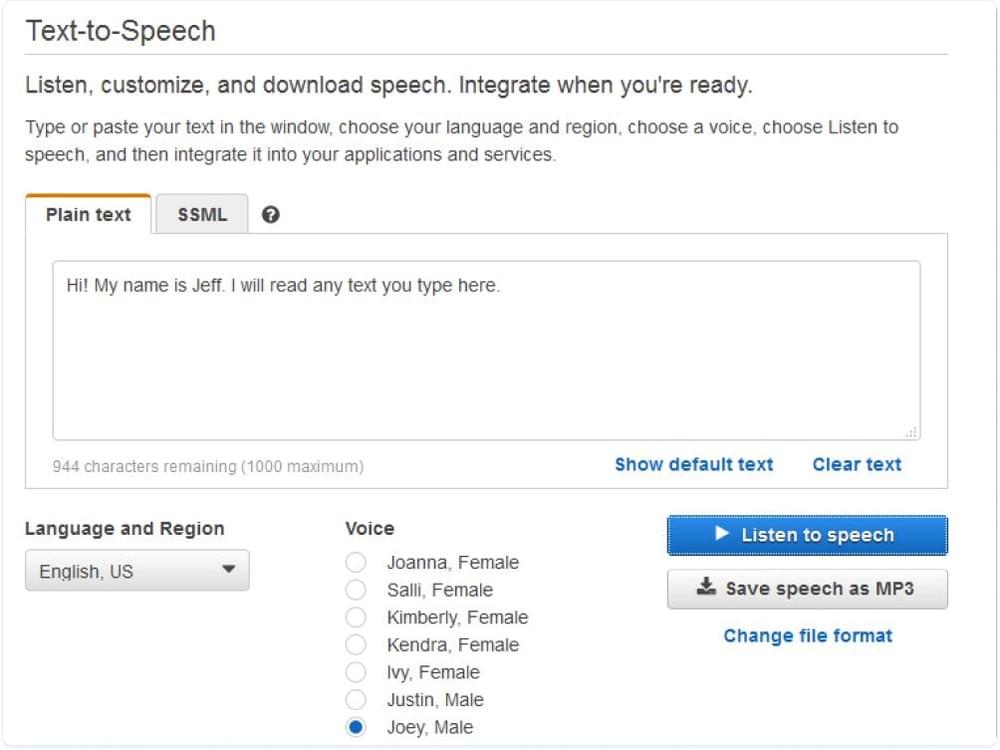
Amazon Polly is another popular text-to-speech synthesis API. It has a large collection of lifelike voices that covers all major languages. Polly is part of the extensive Amazon Web Services (AWS) ecosystem. Hence, you can integrate Polly with other Amazon services to get fast response times and improve real-time TTS applications.
Amazon Polly stands out from other free text-to-speech APIs due to its versatility. It supports everything from simple text conversion to conversion of complex speeches into text. Developers can use the Polly API for diverse use cases.
Pros:
- Advanced deep learning technology to ensure natural-sounding speech
- Extensive voice library
- Fast response times
- Supports various audio formats
Cons:
- You must setup AWS account setup and understand AWS usage-based billing
- Can be overwhelming for users wanting a simple and free text-to-speech API integration
- Voice quality can vary between different language options
5. ReadSpeaker speechCloud API
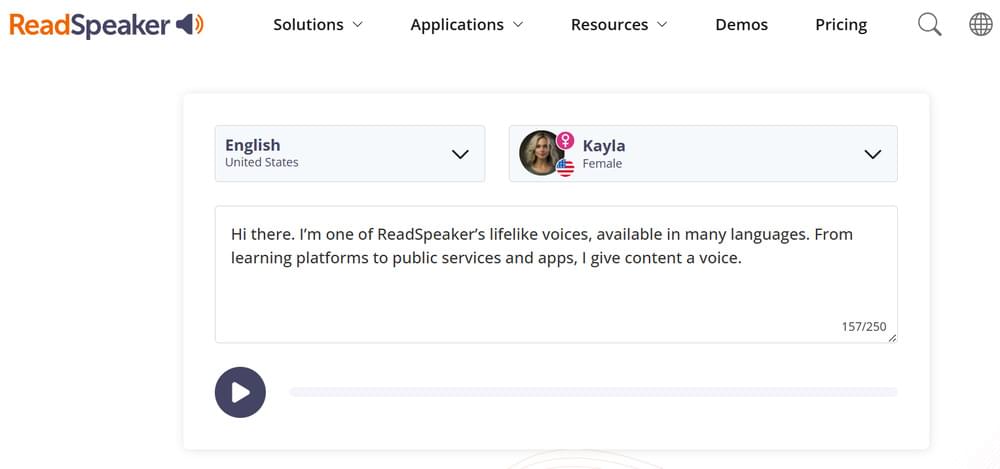
ReadSpeaker speechCloud API has an advanced approach towards text-to-speech services. It has a variety of features that support quick integration as well as advanced customization for more complicated requirements.
The most important features of ReadSpeaker speechCloud API include text synchronization to ensure high accessibility. These features also mean you can use this TTS API in educational apps and websites to improve user comprehension.
Pros:
- Cloud-based operation with easy configuration
- High-quality voices
- Extensive language and dialect support
Cons:
- Unclear pricing structure
- Not a well-known TTS API compared to other major cloud service providers

Choosing the Right Text-to-Speech API
Selecting the right text-to-speech API is heavily dependent on your specific requirements and technical expertise. If you want a large-scale solution, you’ll find enterprise solutions like Google Cloud, Amazon Polly, and IBM Watson to be excellent choices.
However, if you have small-scale requirements and want to add text-to-speech functionality to your website, you should use specialized solutions like WebsiteVoice. It allows you to add the play functionality into your website quickly and try out the free text-to-speech API for 14 days..










